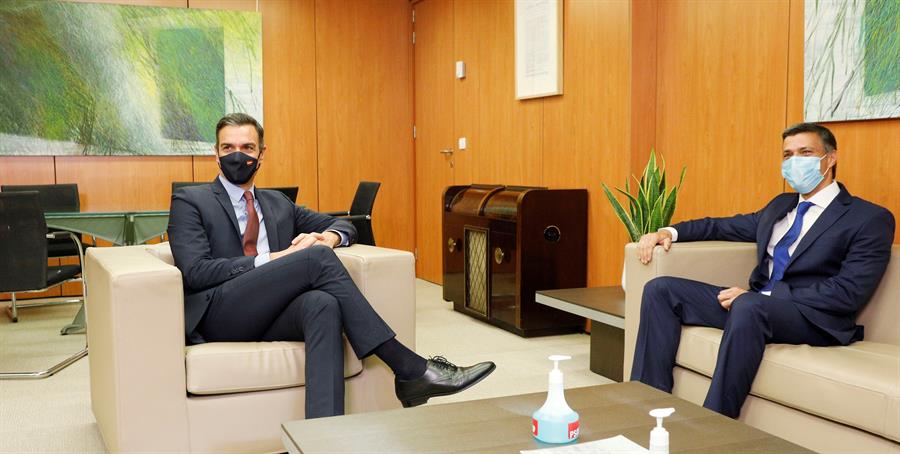
Spanish – The meeting between Venezuelan opposition leader Leopoldo López and Spanish Prime Minister Pedro Sánchez raised more doubts than hope. Firstly, Sánchez did not receive López as the Spanish president of the government at La Moncloa but as secretary-general of the PSOE at the party’s headquarters.
The socialist government of Spain has had a notoriously complacent position towards Nicolás Maduro’s regime. On several occasions, Sánchez met with the High Representative of the European Union (EU) for Foreign Affairs, Josep Borrell, to discuss sending a delegation to Caracas to endorse with international electoral observation the fraudulent election that the regime has scheduled for December 6. The negotiation did not materialize due to Maduro’s refusal to postpone the elections, as the EU had demanded.
The fact that the meeting was held at the party’s residence and not at the Government Palace is an attempt by Sánchez to play down the importance of the meeting with the Venezuelan leader in opposition to Maduro’s regime.
El Secretario General del #PSOE, @sanchezcastejon, se reúne en estos momentos con @leopoldolopez en la sede de #Ferraz.
El PSOE desea una vía pacífica, porque el pueblo venezolano debe sufrir lo mínimo.
? Apostamos por una solución política. ? pic.twitter.com/zrB8ODAFGf
— PSOE (@PSOE) October 27, 2020
Leopoldo López: “Nicolás Maduro is a murderer”
After the meeting, the Venezuelan leader gave a press conference, thanking the Spanish government for its hospitality. He also pleaded with Europe not to turn its back on the crisis Venezuela is going through.
López highlighted Maduro’s criminal character. “Nobody has any doubt that Maduro is a criminal, a murderer, who leads a structure that has plundered and continues to plunder the wealth of Venezuelans.” He also stressed on the need to hold transparent elections that meet international standards. “We demand free, fair, and verifiable presidential elections.
The leader of Voluntad Popular reiterated that “Venezuela will be free” and assured that he had no desire to leave that country. He also made a promise from exile. “We will come back. Venezuelans in exile will come back.”
He added that a negotiated solution with Maduro in power does not seem possible. “It is clear to me that it is very difficult to propose a negotiation with Nicolás Maduro. We are convinced that a transition will have to include people who have been in the power structure of the dictatorship”.
When Sanchez avoided meeting with Guaidó
This contrasts sharply with what happened in January when Pedro Sánchez refused to meet with Juan Guaidó, interim president of Venezuela and Maduro’s opponent.
“We will meet with President Pedro Sánchez at some other time. If we do not meet, we will receive him in Miraflores very soon,” said Guaidó from Madrid. He added that it was a scheduling problem and that they were going to insist on arranging the meeting. Finally, the one who received Guaidó was the Minister of Foreign Affairs, Arancha González.
The Spanish Minister of Transport, José Luis Ábalos, gave his opinion on what happened. He believes that given Spain’s special position with Latin America, his country must be more balanced than others. He pointed out that with Venezuela’s case, they must be more “exquisite” if they want a peaceful solution, reported El Economista.
Sánchez’s position on the recognition of Guaidó and Spain’s mediation for López’s exit from Venezuela raises even more suspicions about the European country’s complicity with the Venezuelan dictatorship.
Socialist policy
The socialist government of Sánchez and Iglesias has shown to have a close relationship with the Maduro regime if we remember the numerous cases of complicity that have come to light, such as the financing of Vice President Pablo Iglesias, Zapatero’s efforts in Caracas, Raúl Morodo’s business with PDVSA, the ‘Delcygate,’ and the suspicious escape of “El Pollo” Carvajal.
In 2016 alone, Rafael Isea, former Minister of Finance of Venezuela, declared to the Unit of Economic and Fiscal Delinquency (UDEF) of Spain that Chávez paid 7 Million Euros (7.6 Million Dollars) to Fundación Podemos.
The ‘Delcygate’ case, which occurred on January 20 of this year, has raised much criticism because Spain allowed Delcy Rodríguez to step on the Barajas airport, ignoring the European Union’s sanctions.
At that time, she met precisely with the Minister of Transportation, José Luis Ábalos, and there was suspicious unloading of some 40 suitcases that were mounted in a vehicle of the Venezuelan Embassy in Madrid and left the airport without passing any security control.
Pedro Sánchez even rewarded one of the main witnesses in the case with a new position: chief inspector of borders with a salary of 10,000 euros and housing conditions that raise the figure to 21,000 euros.
Now, Leopoldo López will lead political actions from Spain as Venezuela’s presidential commissioner for the Center of the Interim Government of Juan Guaidó.
 Versión Español
Versión Español













